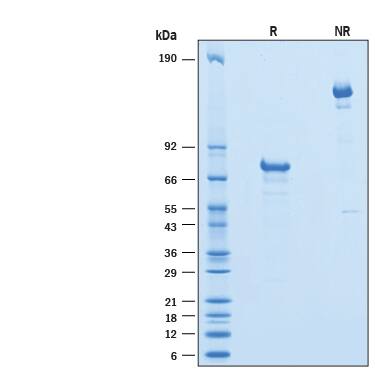Recombinant Mouse Jagged 1 Fc Chimera Protein, CF
R&D Systems, part of Bio-Techne | Catalog # 10969-JG

Key Product Details
Source
NS0
Accession #
Structure / Form
Disulfide-linked homodimer
Conjugate
Unconjugated
Applications
Bioactivity
Product Specifications
Source
Mouse myeloma cell line, NS0-derived mouse Jagged 1 protein
| Mouse Jagged 1 (Ser32-Ile335) Accession # Q9QXX0.1 |
IEGRMDP | Mouse IgG2a (Glu98-Lys330) |
| N-terminus | C-terminus |
Purity
>90%, by SDS-PAGE visualized with Silver Staining and quantitative densitometry by Coomassie® Blue Staining.
Endotoxin Level
<0.10 EU per 1 μg of the protein by the LAL method.
N-terminal Sequence Analysis
Ser32
Predicted Molecular Mass
61 kDa
SDS-PAGE
70-78 kDa, reducing conditions.
Activity
Measured by the ability of the immobilized protein to enhance BMP-2 induced alkaline phosphatase activity in C3H10T1/2 mouse embryonic fibroblast cells. Nobta, M. et al. (2005) J. Biol. Chem. 280:15842.
The ED50 for this effect is 1.00-6.00 μg/mL.
The ED50 for this effect is 1.00-6.00 μg/mL.
Scientific Data Images for Recombinant Mouse Jagged 1 Fc Chimera Protein, CF
Recombinant Mouse Jagged 1 Fc Chimera Protein Bioactivity.
Immobilized Recombinant Mouse Jagged 1 Fc Chimera (Catalog # 10969-JG) enhances BMP-2 (355-BM) induced alkaline phosphatase activity in C3H10T1/2 mouse embryonic fibroblast cells. The ED50 for this effect is 1.00-6.00 ug/mL.Recombinant Mouse Jagged 1 Fc Chimera Protein SDS-PAGE.
2 μg/lane of Recombinant Mouse Jagged 1 Fc Chimera Protein (Catalog # 10969-JG) was resolved with SDS-PAGE under reducing (R) and non-reducing (NR) conditions and visualized by Coomassie® Blue staining, showing bands at 70-78 kDa and 140-160 kDa, respectively.Formulation, Preparation and Storage
10969-JG
| Formulation | Lyophilized from a 0.2 μm filtered solution in PBS. |
| Reconstitution | Reconstitute at 500 μg/mL in PBS. |
| Shipping | The product is shipped at ambient temperature. Upon receipt, store it immediately at the temperature recommended below. |
| Stability & Storage | Use a manual defrost freezer and avoid repeated freeze-thaw cycles.
|
Background: Jagged 1
References
- Ascano, J. M. et al. (2003) J. Biol. Chem. 278:8771.
- Lindsell, C.E. et al. (1995) Cell 80:909.
- Shimizu, K. et al. (1999) J. Biol. Chem. 274:32961.
- Lewis, J. (1998) Stem Cell & Dev. Biol. 9:583.
- Small, D. et al. (2001) J. Biol. Chem. 276:32022.
- Karanu, F. et al. (2000) J. Exp. Med. 192:1365.
- Joutel, A. and E. Tounier-Lasserve (1998) Stem Cell & Dev. Biol. 9:619.
- Hicks, C. et al. (2002) J Neurosci. Res. 68:655.
Alternate Names
CD339, JAG1
Gene Symbol
JAG1
UniProt
Additional Jagged 1 Products
Product Documents for Recombinant Mouse Jagged 1 Fc Chimera Protein, CF
Product Specific Notices for Recombinant Mouse Jagged 1 Fc Chimera Protein, CF
For research use only
